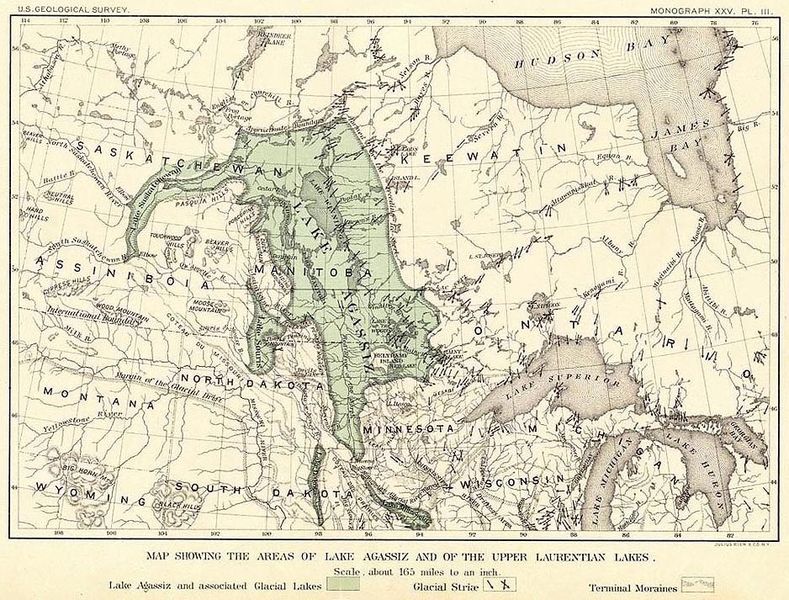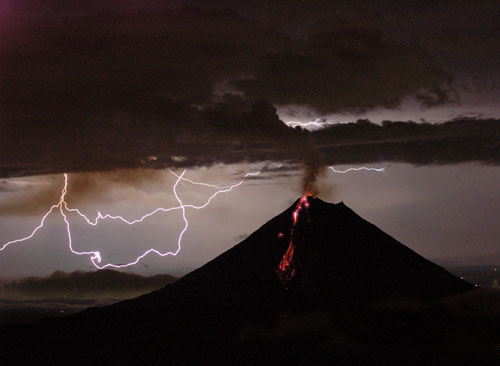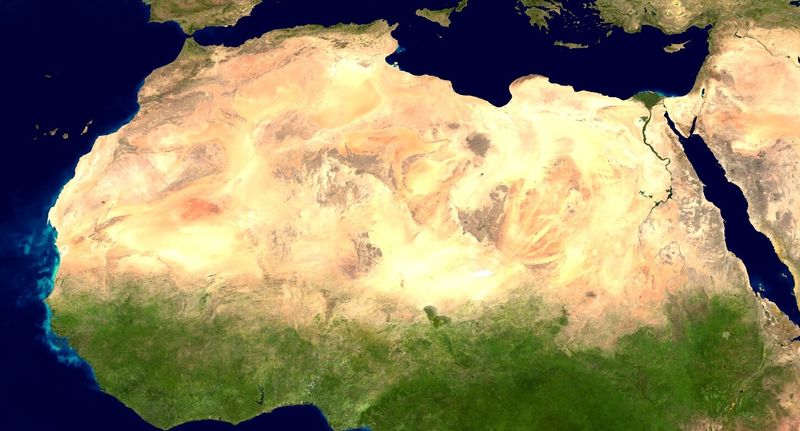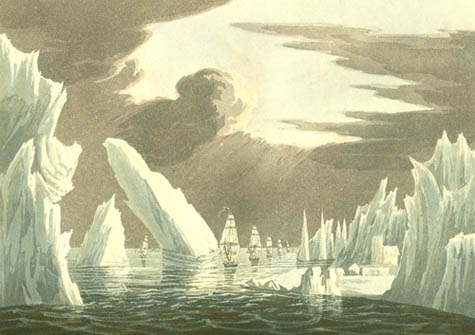What interests me even more, however, is the idea that landscape change can sometimes come first – a volcanic eruption, or a redirected river – sending the Earth's climate out of wack.
 [Image: Lake Agassiz, an ancient glacial lake whose draining may have changed the global climate].
[Image: Lake Agassiz, an ancient glacial lake whose draining may have changed the global climate].Roughly 13,000 years ago, for instance, Lake Agassiz, a gigantic freshwater lake "bigger than all of the present-day Great Lakes combined," broke through its ice dam and flooded up the St. Lawrence Seaway, roaring directly into the Atlantic. As a result, certain oceanic currents shut down and the existing pattern of global temperatures changed in a matter of months.
Or another example: 55 million years ago, the "volcanic eruptions that created Iceland might also have triggered one of the most catastrophic episodes of global warming ever seen on Earth," New Scientist reported last week.
In other words, the formation of Iceland was "accompanied by violent volcanic eruptions that built layers of basalt rock 7 kilometres thick." (!) All that new rock packed "a total volume of 10,000,000 cubic kilometres, enough to build a proto-Iceland in the newly-born north Atlantic."
In the process, though, this "huge volcanic eruption... unleashed so much greenhouse gas into the atmosphere that world temperatures rose by as much as 8°C."
The effect "was disastrous for most life... killing off many deep-sea species."
 [Image: The completely unrelated, but nonetheless beautiful, Arenal Volcano in Costa Rica].
[Image: The completely unrelated, but nonetheless beautiful, Arenal Volcano in Costa Rica].On the other hand, these sorts of changes can obviously work both ways: climate change comes first, affecting rainfall, thus forming deserts where there were once great plains – or any variety of other global warming scenarios.
In an article in The Guardian last week, Mark Lynas explained how the Sand Hills of Nebraska were once part of a vast desert, larger than the Sahara – "an immense system of sand dunes that spread across the Great Plains from Texas in the south to the Canadian prairies in the north," Lynas writes.
But if you overlook the existence of federal irrigation projects, and other government water subsidies, the only major difference between then and now is 1ºC.
In other words, it's only one degree cooler today than it was when huge sand dunes roamed across North America.
Meanwhile, Lynas goes on to explore how, with every jump of only 1ºC in the average planetary temperature today, wildly different landscapes become possible around the world.
The one possibility that truly blows me away – and even makes me want to make a science fiction film, or write a graphic novel, or even publish a BLDGBLOG book of short stories set in this insane new landscape – is this: once Europe is 4ºC hotter than it is today, "new deserts will be spreading in Italy, Spain, Greece and Turkey: the Sahara will have effectively leapt the Straits of Gibraltar."
Imagining the cities of northern Italy buried in sand – with Renaissance statuary chest-deep in dunes...
 [Image: The Sahara desert, waiting to spring upon the unsuspecting streets of Paris... Via Wikipedia].
[Image: The Sahara desert, waiting to spring upon the unsuspecting streets of Paris... Via Wikipedia].Lynas continues:
- In Switzerland, summer temperatures may hit 48ºC, more reminiscent of Baghdad than Basel. The Alps will be so denuded of snow and ice that they resemble the rocky moonscapes of today's High Atlas – glaciers will only persist on the highest peaks such as Mont Blanc. The sort of climate experienced today in Marrakech will be experienced in southern England...
However, I don't mean to celebrate the annihilatory effects of global climate change here; I simply mean to point out that: 1) some of these changes are deliriously surreal and, as such, they're actually quite fun to think about; and 2) a very, very strange future awaits our descendents, should anything even remotely like this come to pass.
Actually, 3): it's also worth pointing out that, today, a novel set in an abandoned Rome, crawling with sand dunes, would be considered a work of science fiction – but, in one hundred years' time, such a setting may be much closer to social realism. In other words, literary genres will also be forced to adapt in an era of rapid climate change. (This same topic is actually discussed in BLDGBLOG's forthcoming interview with novelist Kim Stanley Robinson).
Finally, all of these speculative landscapes of the future have already begun to inspire something of a new golden age for international law. The future of Canada's "Northwest Passage" is a perfect example of this.
As ice continues to thaw throughout the Canadian Arctic, a fantastically convenient shipping route, reaching from the Atlantic through to Asia, is taking shape. This route cuts right through Canada's sovereign terrain – but, with such huge sums of money at stake for international trade, will the Canadian government be able to maintain control over the seaway...?
The question, then, involves whether the Northwest Passage should be considered a "transit passage" – and, thus, subject to Canadian law – or an "international strait" – thus, outside of Canada's reach.
 [Image: The Northwest Passage, as imagined by Sir John Ross, 1819].
[Image: The Northwest Passage, as imagined by Sir John Ross, 1819].According to a recent essay in the London Review of Books, "Canada claims that the passage constitutes Canadian internal waters" – but the United States, perhaps unsurprisingly, "insists that the passage is an 'international strait'."
However, the essay goes on to explain that treating the Passage as an international strait – which means it will be free from Canadian regulations, controls, and other legal constraints – may actually pose unexpected consequences in the realm of international security.
Anyway – etc. etc.
Basically, what I think is cool here is that large-scale terrestrial transformation in an era of rapid climate change is already beginning to impact upon fantastically mundane questions – of law, property, sovereignty, and so on – showing that no matter how sci-fi a situation may likely be, you can always find some way to fit it into human legislation.
In any case, I'm sure I'll be returning to this topic soon.
No comments:
Post a Comment